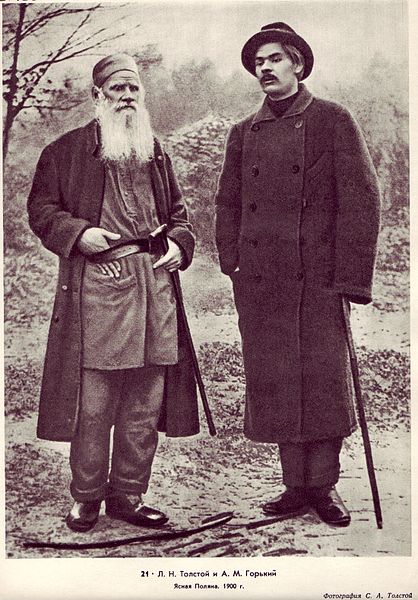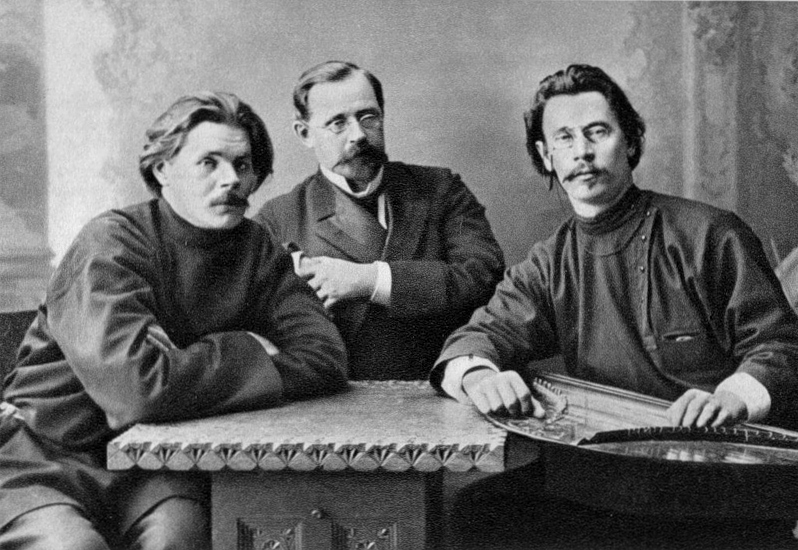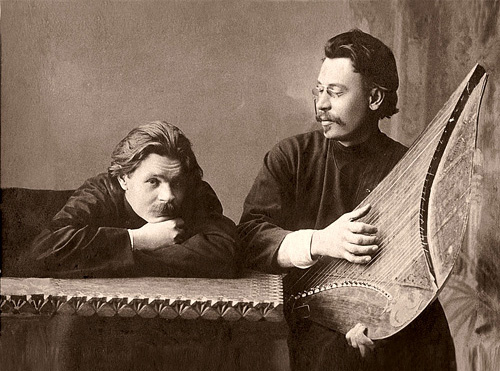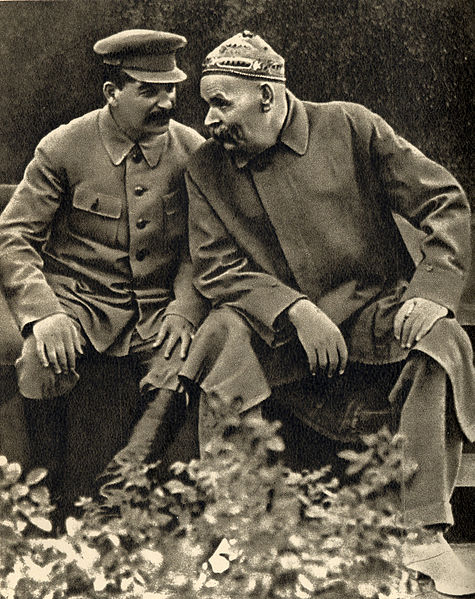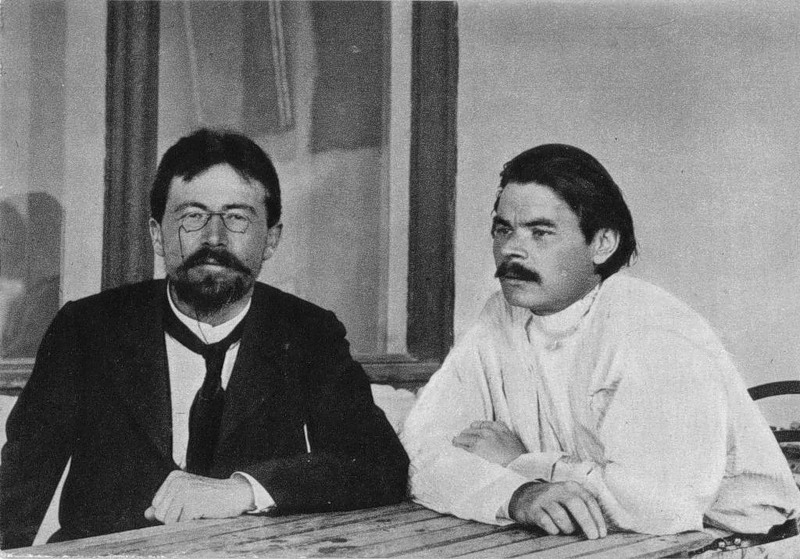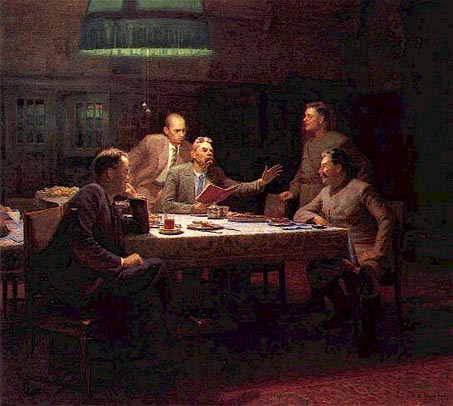<Back to Index>
- Revolutionary Adolph Abramovich Yoffe, 1883
- Writer and Political Activist Maxim Gorky (Alexei Maximovich Peshkov), 1868
PAGE SPONSOR
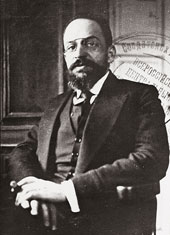
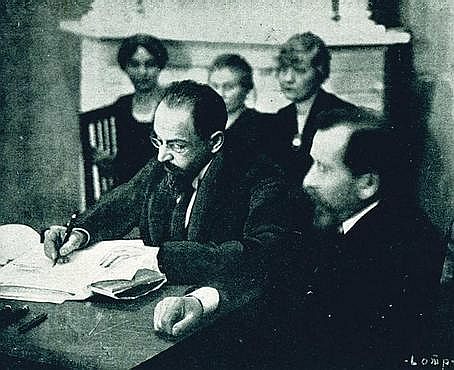
Adolph Abramovich Joffe (Russian: Адо́льф Абра́мович Ио́ффе, alternative transliterations Adolf Ioffe or, rarely, Yoffe) (October 10, 1883, Simferopol – November 16, 1927, Moscow) was a Communist revolutionary, a Bolshevik politician and a Soviet diplomat of Karaite descent.
Joffe was born in Simferopol, Crimea, Russian Empire (currently part of Ukraine de jure and of Russia de facto) in a wealthy Karaite family and became a social democrat in 1900 while still in high school. He formally joined the Russian Social Democratic Labor Party in 1903. In 1904 Joffe was sent to Baku, which he had to flee to avoid arrest. He was then sent to Moscow, but had to flee again, this time abroad. After the events of Bloody Sunday on January 9, 1905, Joffe returned to Russia and took an active part in the Russian Revolution of 1905. In early 1906 he was forced to emigrate and lived in Berlin until his expulsion from Germany in May 1906.
In Russia, Joffe was close to the Menshevik faction within the Russian Social Democratic Party. However, after moving to Vienna in May 1906, he became close to Leon Trotsky's position and helped Trotsky edit Pravda from 1908 to 1912 while studying medicine and psychoanalysis. He also used his family's fortune to support Pravda financially.
In 1912 Joffe was arrested while visiting Odessa, imprisoned for 10 months and then exiled to Siberia.
In 1917, Joffe, freed from the Siberian exile by the February Revolution, returned to the Crimea. Crimean social democrats sent him to the capital, Petrograd, to represent them, but he soon moved to an internationalist revolutionary position, which made it impossible for him to remain in an organization dominated by less radical Mensheviks. Instead, he joined forces with Trotsky, who had just returned from abroad.
In May 1917, Joffe and Trotsky temporarily joined Mezhraiontsy who merged with the Bolsheviks at the VIth Bolshevik Party Congress held between 26 July (all dates are Old Style until February 1918) and 3 August 1917. At the Congress, Joffe was elected a candidate (non - voting) member of the Central Committee, but two days later, on August 5, the Central Committee, some of whose members were in prison, in hiding or lived far from Petrograd and couldn't attend its meetings, made Joffe a member of its permanent ("narrow") bureau. On August 6, Joffe was made an alternate member of the Central Committee Secretariat and on August 20 made a member of the editorial board of the Bolshevik newspaper Pravda which was then temporarily called Proletary (Proletarian) for legal reasons.
Joffe headed the Bolshevik faction in the Petrograd Duma (city government) in the fall of 1917 and was one of the Duma's delegates to the Democratic Conference between September 14 and 22. Although Joffe, along with Lenin and Trotsky, opposed the Bolsheviks' participation in the consultative Pre - parliament created by the Democratic Conference, the motion was carried by the majority of Bolshevik deputies at the Democratic Conference and Joffe was made a Bolshevik member of the Pre - parliament. Two weeks later, on October 7, once the more radical Bolshevik faction gained the upper hand, Joffe and other Bolsheviks walked out of the Pre - parliament.
In October 1917, Joffe supported Lenin's and Trotsky's revolutionary position against Grigory Zinoviev's and Lev Kamenev's more moderate position, demanding that the latter be expelled from the Central Committee after an apparent breach of party discipline. Joffe served as the Chairman of the Petrograd Military Revolutionary Committee which overthrew the Russian Provisional Government on October 25 – 26, 1917. Immediately after the revolution, he supported Lenin and Trotsky against Zinoviev, Kamenev, Alexei Rykov and other Bolshevik Central Committee members who would have shared power with other socialist parties.
From November 30, 1917 until January 1918, Joffe was the head of the Soviet delegation that was sent to Brest - Litovsk to negotiate an end to the hostilities with Germany. On December 22, 1917, Joffe announced the following Bolshevik preconditions for a peace treaty:
- No forcible annexation of territories seized in the war
- Restore national independence where it was terminated during war
- National groups independent before the war should be allowed by referendum to decide question of independence
- Multi - cultural regions should be administered so as to allow all possible cultural independence and self - regulation
- No indemnities. Personal losses should be compensated out of international fund
- Colonial question should be decided according to points 1–4
Although Joffe had signed a ceasefire agreement with the Central Powers on December 2, 1917, he supported Trotsky in the latter's refusal to sign a permanent peace treaty in February. Once the Bolshevik Central Committee decided to sign the Treaty of Brest - Litovsk on February 23, 1918, Joffe remained a member of the Soviet delegation only under protest and in a purely consultative capacity.
Remembering Joffe's presence with the Bolshevik delegation at Brest - Litovsk, Count Ottokar Czernin, the Austro - Hungarians' representative would later write:
The leader of the Russian delegation is a Jew, named Joffe, who has recently been released from Siberia [...] after the meal I had a first conversation with Mr. Joffe. His whole theory is simply based on the universal application of the right of self - governance of nations in the broadest form. The thus liberated nations then have to be brought to love each other [...] I advised him that we would not attempt to imitate the Russian example and that we likewise would not tolerate a meddling in our internal affairs. If he continued to hold on his utopic viewpoints the peace would not be possible and then he would be well advised just to take the journey back with the next train. Mr. Joffe looked astonishedly at me with his gentle eyes and was silent for a while. Then he continued in a - for me, ever unforgettable - friendly, or I would even nearly say suppliant, tone: 'I very much hope that we will also be able to raise the revolution in your country...'
At the VIIth Extraordinary Congress of the Bolshevik Party between
March 6 and March 8, 1918, Joffe was re-elected to the Central
Committee, but only as a candidate (non - voting) member. He remained in
Petrograd when the Soviet government moved to Moscow later in March and
worked as a member of the Petrograd Bureau of the Central Committee
until he was appointed Soviet representative to Germany in April. He
signed the Soviet - German Supplementary Treaty on August 27, 1918. On
November 6, 1918, literally days before the Armistice and the German Revolution, the Soviet delegation in Berlin headed by Joffe was expelled from the country on charges of preparing a Communist uprising in Germany.
In 1919 – 1920, Joffe was a member of the Council of Labor and Defense and People's Commissar (minister) of State Control of the Ukrainian Soviet Republic. He wasn't re-elected to the Central Committee at the VIII Party Congress in March 1919 and would never again occupy a major leadership position. He negotiated a ceasefire with Poland in October 1920 and peace treaties with Estonia, Latvia and Lithuania in late 1920. In 1921 he signed the Peace of Riga with Poland ending the Polish - Soviet War and was made deputy chairman of the Turkestan Commission of the VTsIK and Sovnarkom.
Joffe was one of the Soviet delegates at the Genoa Conference
in February 1922 and, after the Soviet walkout, was made ambassador to
China, as the Soviet troubleshooter (or Kuznetsov) of those days. In
1923, Joffe signed an agreement with Sun Yat-Sen in Shanghai on aid to Kuomintang on the assumption that the latter would cooperate with Chinese Communists, presumably with Lenin's approval. While in China, Joffe traveled to Japan in June 1923 to settle Soviet - Japanese relations. The negotiations proved long and difficult and were aborted when Joffe
became gravely ill and had to be sent back to Moscow. After a partial
recovery, he served as a member of the Soviet delegation to Great Britain in 1924 and as Soviet representative in Austria
in 1924 – 1926. In 1926 his declining health and disagreements with the
ruling Bolshevik faction forced his semi - retirement. He tried to
concentrate on teaching, but it also proved difficult due to his
illness.
Joffe remained a friend and loyal supporter of Leon Trotsky through the 1920s, joining him in the Left Opposition. By late 1927, he was gravely ill, in extreme pain and confined to his bed. After a refusal by the Stalinist leadership of the Communist Party to send him abroad for treatment and Trotsky's expulsion from the Communist Party on November 12, 1927, he committed suicide. He left a farewell letter addressed to Trotsky, but the letter was seized by Soviet secret police agents and later selectively quoted by Stalinists to discredit both Joffe and Trotsky. Trotsky's eulogy at Joffe's funeral was his last public speech in the Soviet Union.
Joffe's daughter, Nadezhda Joffe, an active Trotskyist, survived Stalin's prisons and labor camps and published a memoir, Back in Time: My Life, My Fate, My Epoch.
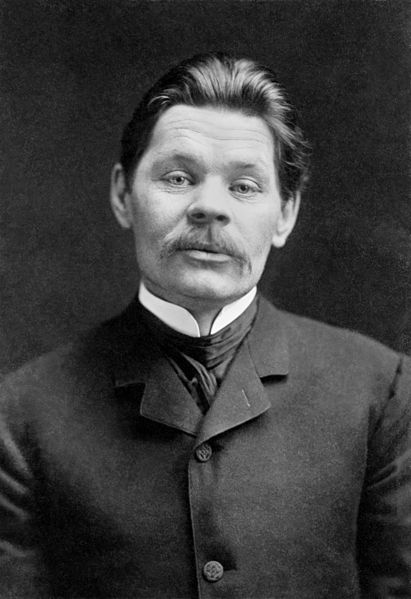
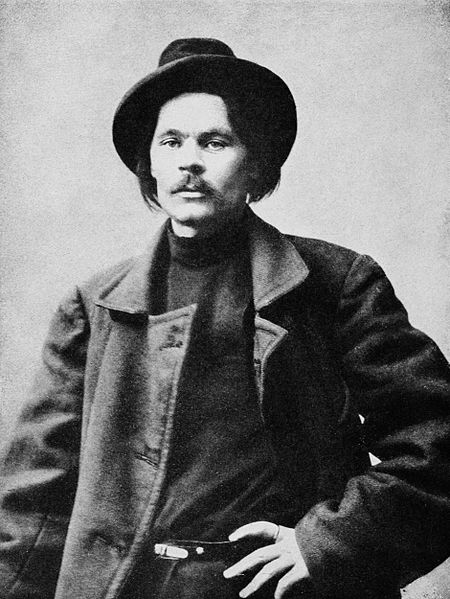
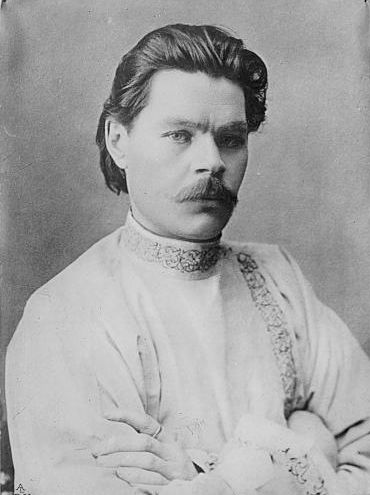
Alexei Maximovich Peshkov (Russian: Алексе́й Макси́мович Пешко́в; 28 March [O.S. 16 March] 1868 – 18 June 1936), primarily known as Maxim Gorky (Russian: Макси́м Го́рький), was a Russian and Soviet author, a founder of the Socialist Realism literary method and a political activist.
Gorky was born in Nizhny Novgorod and became an orphan at the age of nine. In 1880, at the age of twelve, he ran away from home in an effort to find his grandmother. Gorky was brought up by his grandmother. Her death deeply affected him, and after an attempt at suicide in December 1887, he traveled on foot across the Russian Empire for five years, changing jobs and accumulating impressions used later in his writing.
As a journalist working for provincial newspapers, he wrote under the pseudonym Иегудиил Хламида (Jehudiel Khlamida). The name is suggestive of "cloak - and - dagger" by the similarity to the Greek chlamys, "cloak"). He began using the pseudonym Gorky (literally "bitter") in 1892, while working in Tiflis for the newspaper Кавказ (The Caucasus). The name reflected his simmering anger about life in Russia and a determination to speak the bitter truth. Gorky's first book Очерки и рассказы (Essays and Stories)
in 1898 enjoyed a sensational success and his career as a writer began.
Gorky wrote incessantly, viewing literature less as an aesthetic
practice (though he worked hard on style and form) than as a moral and
political act that could change the world. He described the lives of
people in the lowest strata and on the margins of society, revealing
their hardships, humiliations, and brutalization, but also their inward
spark of humanity.
Gorky’s reputation as a unique literary voice from the bottom strata of society and as a fervent advocate of Russia's social, political and cultural transformation grew. By 1899, he was openly associating with the emerging Marxist social democratic movement which helped make him a celebrity among both the intelligentsia and the growing numbers of "conscious" workers. At the heart of all his work was a belief in the inherent worth and potential of the human person (личность, 'lichnost'). In his writing, he counterposed individuals, aware of their natural dignity, and inspired by energy and will, with people who succumb to the degrading conditions of life around them. Both his writings and his letters reveal a "restless man" (a frequent self - description) struggling to resolve contradictory feelings of faith and skepticism, love of life and disgust at the vulgarity and pettiness of the human world.
He publicly opposed the Tsarist regime and was arrested many times. Gorky befriended many revolutionaries and became Lenin's personal friend after they met in 1902. He exposed governmental control of the press (Matvei Golovinski affair). In 1902, Gorky was elected an honorary Academician of Literature, but Tsar Nicholas II ordered this annulled. In protest, Anton Chekhov and Vladimir Korolenko left the Academy.
The years 1900 to 1905 saw a growing optimism in Gorky’s writings. He became more involved in the opposition movement, for which he was again briefly imprisoned in 1901. In 1904, having severed his relationship with the Moscow Art Theater in the wake of conflict with Vladimir Nemirovich - Danchenko, Gorky returned to Nizhny Novgorod to establish a theater of his own. Both Constantin Stanislavski and Savva Morozov provided financial support for the venture. Stanislavski saw in Gorky's theater an opportunity to develop the network of provincial theaters that he hoped would reform the art of the stage in Russia, of which he had dreamed since the 1890s. He sent some pupils from the Art Theater School — as well as Ioasaf Tikhomirov, who ran the school — to work there. By the autumn, however, after the censor had banned every play that the theater proposed to stage, Gorky abandoned the project. Now a financially successful author, editor and playwright, Gorky gave financial support to the Russian Social Democratic Labor Party (RSDLP), as well as supporting liberal appeals to the government for civil rights and social reform. The brutal shooting of workers marching to the Tsar with a petition for reform on January 9, 1905 (known as the "Bloody Sunday"), which set in motion the Revolution of 1905, seems to have pushed Gorky more decisively toward radical solutions. He now became closely associated with Vladimir Lenin's Bolshevik wing of the party — though it is not clear whether he ever formally joined and his relations with Lenin and the Bolsheviks would always be rocky. His most influential writings in these years were a series of political plays, most famously The Lower Depths (1902). In 1906, the Bolsheviks sent him on a fund raising trip to the United States, where in the Adirondack Mountains Gorky wrote his famous novel of revolutionary conversion and struggle, Мать (Mat’, The Mother). His experiences there — which included a scandal over his traveling with his lover rather than his wife — deepened his contempt for the "bourgeois soul" but also his admiration for the boldness of the American spirit. While briefly imprisoned in Peter and Paul Fortress during the abortive 1905 Russian Revolution, Gorky wrote the play Children of the Sun, nominally set during an 1862 cholera epidemic, but universally understood to relate to present day events.
From 1906 to 1913, Gorky lived on the island of Capri, partly for health reasons and partly to escape the increasingly repressive atmosphere in Russia.
He continued to support the work of Russian social democracy,
especially the Bolsheviks, and to write fiction and cultural essays. It
was during this time that Gorky first met Vladimir Illych Lenin. Most
controversially, he articulated, along with a few other maverick
Bolsheviks, a philosophy he called "God - Building",
which sought to recapture the power of myth for the revolution and to
create a religious atheism that placed collective humanity where God had
been and was imbued with passion, wonderment, moral certainty and the
promise of deliverance from evil, suffering, and even death. Though
'God - Building' was suppressed by Lenin, Gorky retained his belief that
"culture" — the moral and spiritual awareness of the value and potential
of the human self — would be more critical to the revolution’s success
than political or economic arrangements.
An amnesty granted for the 300th anniversary of the Romanov Dynasty allowed Gorky to return to Russia in 1913, where he continued his social criticism, mentored other writers from the common people, and wrote a series of important cultural memoirs, including the first part of his autobiography. On returning to Russia, he wrote that his main impression was that "everyone is so crushed and devoid of God's image." The only solution, he repeatedly declared, was "culture".
During World War I, his apartment in Petrograd was turned into a Bolshevik staff room, and his politics remained close to the Bolsheviks throughout the revolutionary period of 1917. These relations became strained, however, after his newspaper Novaya Zhizn (Новая Жизнь, "New Life") fell prey to Bolshevik censorship during the ensuing civil war, around which time Gorky published a collection of essays critical of the Bolsheviks called Untimely Thoughts in 1918. (It would not be re-published in Russia until after the collapse of the Soviet Union.) The essays call Lenin a tyrant for his senseless arrests and repression of free discourse, and an anarchist for his conspiratorial tactics; Gorky compares Lenin to both the Tsar and Nechayev.
In 1921, he hired a secretary, Moura Budberg, then she became an unofficial wife. In August 1921, Nikolay Gumilev, his friend and fellow writer was arrested by the Petrograd Cheka for his monarchist
views. Gorky hurried to Moscow, obtained an order to release Gumilyov
from Lenin personally, but upon his return to Petrograd he found out
that Gumilev had already been shot. In October, Gorky returned to Italy on health grounds: he had tuberculosis.
According to Alexander Solzhenitsyn, Gorky's return to the Soviet Union was motivated by material needs. In Sorrento, Gorky found himself without money and without fame. He visited the USSR several times after 1929, and in 1932 Joseph Stalin personally invited him to return for good, an offer he accepted. In June 1929, Gorky visited Solovki (cleaned up for this occasion) and wrote a positive article about that Gulag, which had already gained ill fame in the West. Later he stated that everything he had written was under the control of censors. What he actually saw and thought when visiting the camp has been a highly discussed topic.
Gorky's return from Fascist Italy was a major propaganda victory for the Soviets. He was decorated with the Order of Lenin and given a mansion (formerly belonging to the millionaire Ryabushinsky, now the Gorky Museum) in Moscow and a dacha in the suburbs. One of the central Moscow streets, Tverskaya, was renamed in his honor, as was the city of his birth. The largest fixed wing aircraft in the world in the mid 1930s, the Tupolev ANT-20 was named Maxim Gorky in his honor.
On October 11, 1931 Gorky read his fairy tale "A Girl and Death" to his visitors Joseph Stalin, Kliment Voroshilov and Vyacheslav Molotov, an event that was later depicted by Viktor Govorov in his painting. On that same day Stalin left his autograph on the last page of this work by Gorky: "Эта штука сильнее чем "Фауст" Гёте (любовь побеждает смерть)" ("This piece is stronger than Goethe's Faust (love defeats death)". In 1933, parting with Moura Budberg, Gorky edited an infamous book about the White Sea - Baltic Canal, presented as an example of "successful rehabilitation of the former enemies of proletariat". With the increase of Stalinist repression and especially after the assassination of Sergei Kirov in December 1934, Gorky was placed under unannounced house arrest in his house near Moscow.
The sudden death of Gorky's son Maxim Peshkov in May 1934 was followed by the death of Maxim Gorky himself in June 1936. Speculation has long surrounded the circumstances of his death. Stalin and Molotov were among those who carried Gorky's coffin during the funeral. During the Bukharin trials in 1938, one of the charges was that Gorky was killed by Yagoda's NKVD agents.
In Soviet times, before and after his death, the complexities in
Gorky's life and outlook were reduced to an iconic image (echoed in
heroic pictures and statues dotting the countryside): Gorky as a great
Soviet writer who emerged from the common people, a loyal friend of the
Bolsheviks, and the founder of the increasingly canonical "socialist realism".
The Gorky Trilogy is a series of three feature films: The Childhood of Maxim Gorky, My Apprenticeship, and My Universities, directed by Mark Donskoi, filmed in the Soviet Union, released 1938 - 1940. The trilogy was adapted from Gorky's autobiography.
The German modernist Bertolt Brecht based his epic play The Mother (1932) on Gorky's novel of the same name. Gorky's novel was also adapted for an opera by Valery Zhelobinsky in 1938. In 1912, the Italian composer Giacomo Orefice based his opera Radda on the character of Radda from Makar Chudra.
